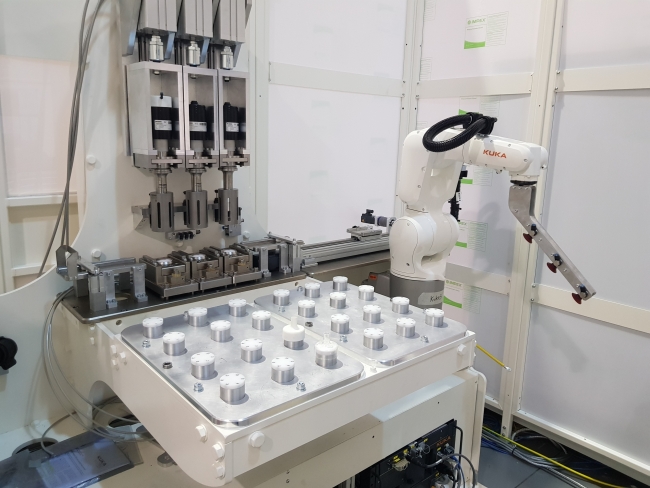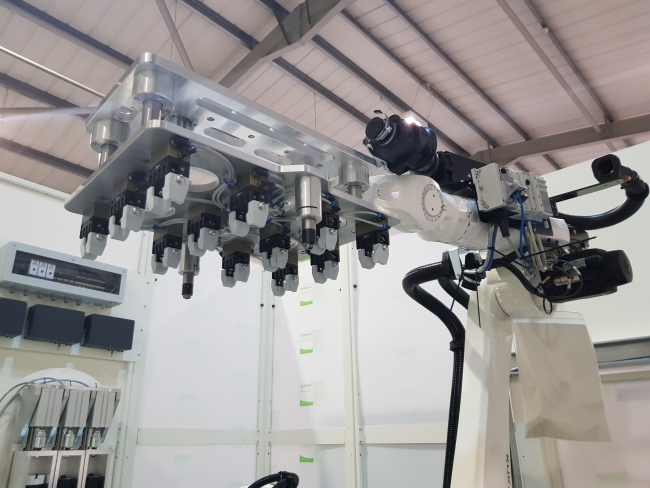4 minute read • published in partnership with KUKA
Case Study: Diversifying automated processes within the plastics sector
KUKA UK Gold system partner, PC Moulding & Automation has witnessed a significant decline in automotive manufacturing, with certain next generation model launch plans being shelved in favour of EV alternatives so diversified its offering, to adapt to a changing manufacturing landscape.
In the third quarter of 2019, enquiry levels were consistently high with some 75% of their order intake attributed to automotive. A further 20% of enquiries came from the medical sectors and 5% ‘other’.
Roger Ewers, Sales Director at PC Moulding, says: “Automotive project enquiries were often based not only around the need to deliver labour savings, but address complexity of assembly for which automation was a natural fit”.
Insert loading is still a huge consideration within the automotive sector, primarily for two reasons. Health & safety considerations dictate that operators should not be climbing inside of large machinery, to reduce the risks associated with trips, falls and the likelihood of injury. Solutions such as that pictured illustrate how bespoke applications that incorporate end of arm tooling, in this instance a double-sided end effector with demould, insert load and insert gripper capability, can undertake such tasks. This particular automated, application manages the insert loading from a sliding table exterior of the cell perimeter, picked by the end of arm tooling which is equipped with a Schunk QC (quick changeover) system – the EOAT can be changed within the cell and without an operator intervention.

PC Moulding & Automation diversified its offering to adapt to a changing manufacturing landscape / Picture: KUKA
Roger adds: “When historically 70% of your inbound enquires satisfy a specific sector and that dynamic changes suddenly and unexpectedly, you have to diversify. We had to take the experience that we have and apply it in other areas”.
Medical and pharma projects are gradually being brought back to the UK, as manufacturers re-shore post Brexit, with a focus upon productivity gains, increased throughput and improved efficiencies.
“When COVID hit the UK, the demand for breathing devices and respirators soared. As a result, the production and manufacturing of filters intended for use in these systems increased the demand for automation, as manufacturers recognised the benefits afforded by robotic process automation”.
PC Moulding & Automation produced an automated filter production line which comprised three KUKA KR AGILUS HM (hygiene machine) 6 axis industrial robots and ultrasonic cutting tooling for the filter medium, applying similar principles to the execution of the application of those which had been undertaken for automotive clients.
“Automation enquiry levels continued to rise throughout 2020, a large majority of which we found were intended to address reduced staff levels whilst increasing output. Unfortunately, as automotive manufacturing was severely impacted by the pandemic, medical was our primary sector focus in 2020, and into 2021. Automotive is recovering slowly, but with certain next generation model launch plans being shelved in favour of EV alternatives, new model EV launches are being planned over the next five years and onwards, supporting that recovery”, Roger concluded.

The plastics sector is one of many that KUKA is witnessing an increase in the adoption of robots / Picture: KUKA
Adam Hudson, Sector Manager for plastics and injection moulding at KUKA UK, echoes the opinions of Roger, in that the COVID-19 pandemic has encouraged manufacturers, who might not have considered automation as a natural fit to their operations to view robots as a value-add, supplementary technology.
“The benefits that can be afforded through the adoption of robotic process automation are endless but more importantly measurable. The range of industrial robots available to choose from can be applied to almost any task in any environment”.
Adam continues: “The plastics industry is a diverse and fast moving focus sector for KUKA and as such, we work closely with PC Mouldings to ensure that we provide the correct solution to our customers exacting requirements, with a number of considerations at the heart of their design, from productivity gains to cost savings, health and safety compliance to quality output. All are valid requirements that can be addressed through the adoption of automation”.
“Some quick examples include; the KUKA KR DELTA that can be used effectively within a conveyor application: fast moving plastic components can be detected through vision and fast picked, stacked and sorted at high speed; the KUKA KR SCARA used for fast picking in cost sensitive plastic applications, offering high levels of accuracy and reliability; the LBR iiwa can be utilised within complex mould removal applications. Using the sensitivity of the robot products are released from the moulds, thus reducing breakages and the likelihood of injury to the operator”.
Adam concluded: “The plastics sectors is one of many that is witnessing an increase in the adoption of robots. Currently the UK lag behind our European peers, with only 71 robots per 10,000 workers, compared to Europe’s 73. The gap is closing and as reshoring accelerates we anticipate that UK manufacturing will finally acknowledge the benefits associated with robotic process automation, and stamp our mark as a leader on the global manufacturing map”.
